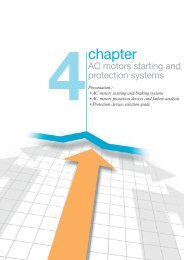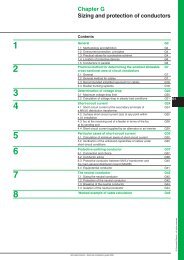Connect - Schneider Electric
Connect - Schneider Electric
Connect - Schneider Electric
Create successful ePaper yourself
Turn your PDF publications into a flip-book with our unique Google optimized e-Paper software.
The Group may be exposed to the risk of claims for breaches of<br />
environmental laws and regulations. Such claims could adversely<br />
affect the Group’s fi nancial position and reputation, despite<br />
the efforts and investments made to comply at all times with all<br />
applicable environmental laws and regulations.<br />
If the Group fails to conduct its businesses in full compliance with<br />
the applicable environmental laws and regulations, the judicial<br />
Information systems risk<br />
The Group operates, either directly or through service providers,<br />
a wide range of highly complex information systems (servers,<br />
networks, applications, databases, etc.) that are essential to the<br />
effi ciency of its sales and manufacturing processes. Failure of any of<br />
these hardware or software systems, a fulfi lment failure by a service<br />
provider, human error or computer viruses could adversely affect<br />
the quality of service offered by the Group.<br />
The Group regularly examines alternative solutions to protect<br />
against this type of risk and has developed contingency plans to<br />
mitigate the effects of any information system failure. Dedicated<br />
governance structures have been set up to manage relations with<br />
service providers responsible for outsourced IT systems operations.<br />
Problems may also be encountered during the deployment of new<br />
applications or software. In particular, in the last few years, the<br />
Group has developed an information system under SAP (bridge),<br />
which it started to roll out in 2008. This roll-out process was<br />
Market risks<br />
Interest rate risk<br />
The Group is exposed to risks associated with the effect of changing<br />
interest rates. Interest rate risk on borrowings is managed at<br />
Group level, based on consolidated debt and according to market<br />
conditions. The core aim of interest rate management policies is<br />
to optimise overall borrowing costs. Most bond debt is fi xed rate.<br />
At December 31, 2011, 81% of the Group’s gross debt was fi xed rate.<br />
Maturities of fi nancial assets and liabilities are presented in note 26.4<br />
to the consolidated fi nancial statements.<br />
A 1% change in interest rates would have an impact of around<br />
EUR12 million on the Group’s net fi nancial expense.<br />
The fi nancial instruments used to hedge the exposure of the<br />
Group to fl uctuations in interest rates are described in note 26<br />
to the consolidated fi nancial statements for the year ended<br />
December 31, 2011.<br />
DESCRIPTION OF THE GROUP, AND ITS STRATEGY, MARKETS AND BUSINESSES<br />
RISK FACTORS<br />
or regulatory authorities could require the Group to conduct<br />
investigations and/or implement costly clean-up measures to deal<br />
with the current or past contamination of current or former facilities<br />
or off-site waste disposal facilities, and to scale back or temporarily<br />
or permanently close facilities in accordance with the applicable<br />
environmental laws and regulations.<br />
carried out fully or partially in 17 countries in 2009 and 2010, and<br />
will continue in 2012 and over several more years, depending on<br />
strategic, technical and economic priorities.<br />
In view of the project’s complexity, extensive functionalities and its<br />
worldwide deployment, a dedicated governance and cost control<br />
structure has been set up to track attainment of project milestones<br />
and limit the related risks.<br />
However, despite the Group’s policy of establishing governance<br />
structures and contingency plans, there can be no assurance<br />
that information systems projects will not be subject to technical<br />
problems or execution delays. While it is diffi cult to accurately<br />
quantify the impact of any such problems or delays, they could<br />
have an adverse effect on inventory levels, service quality and,<br />
consequently, the Group’s fi nancial results.<br />
The Group’s international operations expose it<br />
to the risk of fluctuations in foreign exchange<br />
rates<br />
Due to the fact that a signifi cant proportion of transactions of<br />
<strong>Schneider</strong> <strong>Electric</strong> are denominated in currencies other than the<br />
euro, the Group is exposed to currency risk. If the Group is not able<br />
to hedge them, fl uctuations in exchange rates between the euro<br />
and these currencies can have a signifi cant impact on its results<br />
of operations and distort year-on-year performance comparisons.<br />
The Group actively manages its exposure to currency risk to reduce<br />
the sensitivity of earnings to changes in exchange rates. Hedging<br />
programs mainly concern foreign currency receivables, payables<br />
and operating cash fl ows, which are generally hedged by means of<br />
forward purchases and sales.<br />
Depending on market conditions, risks in the main currencies may<br />
be hedged based on cash fl ow forecasting using contracts that<br />
expire in 12 months or less.<br />
The Group’s currency hedging policy is to protect subsidiaries against<br />
risks on all transactions denominated in a currency other than their<br />
functional currency. More than twenty currencies are involved, with<br />
2011 REGISTRATION DOCUMENT SCHNEIDER ELECTRIC<br />
37<br />
1

















